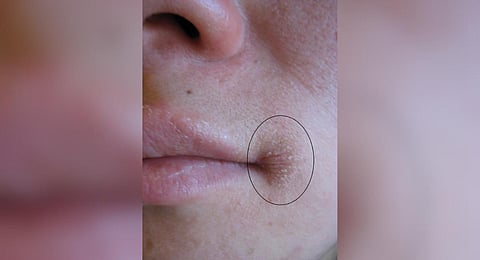

BENGALURU: An inflammatory skin disorder known as Angular Cheilitis results in swollen, red patches near the corners of the mouth. This is typically not a serious situation. As a result, you are unable to eat, speak, or behave normally in front of people. Fortunately, there are treatments that can help reduce inflammation and provide relief from the pain. It is important to seek medical advice to get back a healthy smile.
Angular Cheilitis is also known as stomatitis and perleche. People frequently mistake this for herpes-related cold sores and attempt to cure it with coconut oil or cheese. Angular Cheilitis is not communicable.
Causes
Angular Cheilitis can affect people of any age, gender, or ethnicity. However, due to the high levels of drooling or salivation caused by many factors, this syndrome is frequently seen in children and older adults. Our saliva contains specific enzymes that help break down our food. Dryness is brought on by saliva that has gathered in the corners of the mouth, and this dryness can eventually cause the skin to crack open, resulting in Angular Cheilitis.
Other causes include nutritional inadequacies, iron shortage, snoring while sleeping, crooked teeth, atopic dermatitis, thumb sucking, smoking, stress, and face mask use. On rare occasions, bacteria or fungus that enter the crack cause infection or inflammation.
Symptoms
Sores at mouth and lip corners are the typical symptoms. The additional signs are:
Diagnosis
After a reliable source of treatment is ineffective, your family doctor or a dermatologist can diagnose Angular Cheilitis by taking a mouth swab to test for viruses like herpes or any fungal infections. In addition to examining your lifestyle, health history, and symptoms, they may also perform blood tests for any nutritional deficiencies.
Treatment
If the lack of nutrients such as protein, iron, or B vitamins are the cause of the issue, the expert may suggest taking dietary supplements.
If a fungus is to blame, antifungal medication will be given to apply topically. If bacterial infection is the reason, the specialist will suggest an antibiotic ointment.
Topical antiseptics are one more alternative for treatment of mouth sores along with topical steroid cream and injections of filler to lessen mouth cracks.
Prevention
You can lessen the possibility of infections developing by keeping the area surrounding your mouth moisturised and irritation-free. To prevent saliva buildup at the corners of your mouth, you can also use petroleum jelly or coconut oil.
The following guidelines can help lower the risk too: